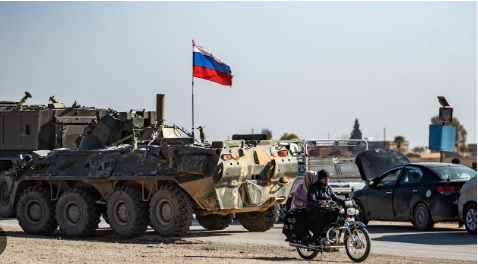Russia’s Silence on Syria’s Request for Military Bases: A Complex Geopolitical Landscape
The relationship between Russia and Syria has long been a subject of intense international scrutiny, particularly in the context of military cooperation. Russia, under President Vladimir Putin, has been a staunch ally of Syrian President Bashar al-Assad, providing military support throughout the Syrian Civil War. However, recent reports have shed light on a potentially significant development: Syria’s request for Russia to establish military bases within its territory. Despite the gravity of this request, Russia has remained unusually tight-lipped, raising questions about the broader implications for the region and international diplomacy. This silence could signal a more complex and evolving geopolitical landscape.
The Strategic Importance of Syria for Russia
Syria holds significant geopolitical importance for Russia, primarily due to its location in the Middle East and its role as a key ally in the region. Since the onset of the Syrian Civil War in 2011, Russia has intervened militarily to support al-Assad’s regime, with the aim of maintaining its influence in the region and preserving its access to military bases. The Russian naval facility in Tartus and the airbase in Hmeimim have been pivotal in this strategy, providing Russia with a rare foothold in the Mediterranean.
These bases offer Russia strategic advantages, allowing it to project power across the region, especially in light of the increasing presence of Western powers in the Middle East. The ongoing conflict in Syria has only cemented Russia’s position as a major player in the region. However, the request by Syria to host additional Russian military installations raises concerns about the broader implications for Russian influence in the Middle East and the potential reactions from other regional actors.
Syria’s Request for Additional Russian Military Bases
Syria’s request for additional Russian military bases has been met with silence from Moscow, which raises questions about the nature of the relationship between the two nations. While both countries have been allies throughout the civil war, the specifics of the request, including the number of bases and their intended locations, have not been publicly confirmed.
This request is seen as an effort by al-Assad to further strengthen his relationship with Russia, ensuring continued military and political support. By hosting additional Russian military bases, Syria could solidify its position as a Russian ally and increase its leverage in the ongoing power struggle with opposition forces. The request could also be viewed as a reflection of Syria’s weakened position, relying on external military assistance to maintain its territorial integrity.
Russia’s Reluctance to Publicly Address the Request
Despite the apparent importance of the request, Russia has refrained from making any public comments. There are several reasons for this silence. One possibility is that Russia is carefully assessing the geopolitical ramifications of such a move. Establishing additional military bases in Syria could provoke reactions from Western powers, particularly the United States and European Union, who have been critical of Russia’s involvement in Syria.
Furthermore, Russia may be weighing the potential costs and benefits of expanding its military footprint in Syria. While additional bases would enhance Russia’s strategic position, they could also lead to increased military and economic commitments. The Russian government has been keen to avoid further entanglement in Syria’s ongoing conflict, which has already proven to be costly in terms of both lives and resources.
International Reactions and Regional Implications
The silence from Russia on Syria’s request is also likely motivated by concerns over international reactions. The presence of additional Russian military bases in Syria would likely draw criticism from the West and further complicate Russia’s already tense relations with NATO. The United States, in particular, has been critical of Russia’s intervention in Syria, and the establishment of new military bases would likely provoke a strong response.
Additionally, regional actors such as Turkey, Israel, and Saudi Arabia may view the expansion of Russian military influence in Syria as a threat to their own strategic interests. Turkey, which has been involved in military operations in northern Syria, is particularly sensitive to any increase in Russian military presence, as it could challenge Turkey’s own ambitions in the region. Israel, too, has expressed concerns about the growing Russian influence in Syria, particularly in relation to the presence of Iranian forces, which are aligned with al-Assad’s regime.
The Broader Geopolitical Context
Russia’s tight-lipped stance on Syria’s request must also be understood within the broader context of its foreign policy goals. Russia has consistently sought to counterbalance Western influence in the Middle East and has used its military presence in Syria as a means of asserting its dominance in the region. However, the dynamics in Syria are shifting. As the civil war winds down and al-Assad regains control over much of the country, Russia must navigate a delicate balance between securing its strategic interests and avoiding further escalation.
The situation is further complicated by the growing influence of China in the Middle East. As Beijing seeks to expand its presence in the region, Russia may be hesitant to make any decisions that could upset its strategic partnership with China. This complicates the calculus for Russian decision-makers, as they seek to maintain a balance between competing interests in the region.
Conclusion: A Silent but Strategic Decision
Russia’s reluctance to openly discuss Syria’s request for additional military bases is indicative of the complex and fluid nature of its relationship with the Syrian regime. While Syria’s request for more Russian military presence signals the continued importance of their alliance, Russia’s silence underscores the challenges it faces in navigating a volatile geopolitical landscape. The outcome of this request will likely have far-reaching consequences not only for Russia and Syria but for the broader Middle Eastern region and international diplomacy as a whole. In the end, the silence may be part of a broader strategy to maintain flexibility while carefully weighing the implications of such a significant decision.


Leave a Comment